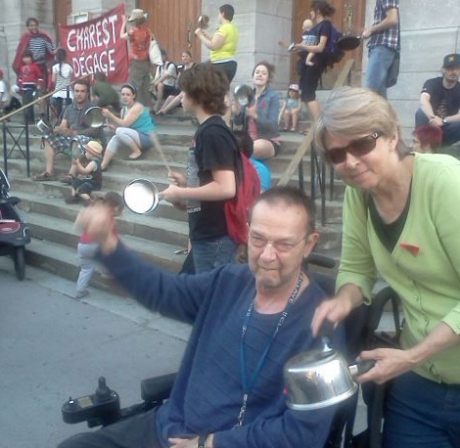Obituaries
You are here
David Fennario: A voice of revolution in the theatre and in the streets

September 20, 2023
It is with heavy hearts that we learned of the death of Dave Fennario on September 16th. Dave was a playwright and poet who aimed to tear down the fourth wall between stage and audience. But he was also a revolutionary socialist who believed that art could break down the walls between working people and their own power to change society.
Fennario brought revolutionary politics to every story he told, even when it wasn’t explicit. But as Dave always said, a show should also always be a good night out.
Before he even wrote his first play, he was “discovered” and hired at a theatre as a writer in residence. He had a natural ear for dialogue that made a play « sing » and reflect a working-class sound and experience in the community of Verdun, Montreal.
But his plays had a deep echo in francophone Quebec as well. He was a proud recipient of the Prix Pauline-Julien for his 1991 play Joe Beef, set in Verdun, and he will always be widely remembered for Balconville, the first bilingual play in the history of Canadian theatre – a play about breaking down the walls between the two solitudes of Quebec’s working class anglophones and francophones.
Bolsheviki and Motherhouse
But Fennario should also be remembered for his last two plays, Bolsheviki: A Dead Serious Comedy and Motherhouse, companion pieces about the disaster that WWI disproportionately wreaked on working-class Verdun. These two plays became the basis for a coordinated action by activists across Canada using staged readings to challenge the horrific display of militaristic Canadian nationalism on the hundredth anniversary of Vimy Ridge in 2017 – a ruling class propaganda exercise that Dave referred to as “Vimy-ridging.”
And 2017 was also the 100th anniversary of what Fennario believed really brought an end to WWI: the Russian revolution of ordinary workers and peasants. This is a central theme in Bolsheviki. The playwright’s note explains the play is based on an interview Dave did with Harry “Rosie” Rowbottom, a WWI vet who was wounded at Vimy Ridge.
In 1979, over a bottle of Bushmills and a tape recorder, Rowbottom told him about being in a military hospital in November 1917 when news broke out about revolution in Russia: “He said he could see the news spreading from bed to bed along the ward like an electric shock – that Russian soldiers were deserting en masse in their millions: 'And we knew then what we had to do…put an end to the war before it put an end to us.'"
His first inspiration for Motherhouse was a war-time munitions factory near his home in Verdun, now turned into condos. More specifically, it was a canteen photo with one woman munitions worker in the crowd staring into the camera with a defiant gaze. From this came the character of Lilibet – and an entire play about resistance not only to war but to the exploitation of workers in unsafe conditions who paid with their lives on the home front as well.
Motherhouse was produced at Montreal’s Centaur Theatre in February 2014. Dave brought a whole crew of his friends from Verdun and comrades from out of town to help him oversee the production and its politics.
He made sure the set integrated the anti-war symbol of the white poppy, and that on opening night there would be a table in the theatre lobby to distribute white poppy pins and information from Échec à la guerre, the main anti-war coalition in Montreal. It had been instrumental in the mass demonstrations of 2003 that kept Canada out of the war in Iraq. For him, building the anti-war movement had to be central to the production.
He organized his own political outreach for Motherhouse, beyond simple theatre publicity, to reach francophone students in CEGEPs and UQAM. Even though the play was in English, at an English theatre, many came. This was in the aftermath of the incredible 2012 “Maple Spring,” the uprising of Quebec students that repealed legislation and toppled a government. That was an event that Dave could not celebrate enough.
He revelled in joining the “casseroles,” a nightly event during that student strike when supporters came out onto their street corners to bang pots and pans in defiance of government repression and in support of the uprising. It was a moment when the audience was finding ways to join the action onstage.
Theatre and revolution
For Fennario there was never a separation between theatre and politics. He once even picketed one of his own shows to respect a picket line of striking ushers.
During the shooting of the 2014 documentary, Fennario: The Good Fight by Martin Duckworth, Dave visited the War Museum in Ottawa and stopped in front of an exhibit from nearly every war, from the Boer war to WWII, to talk about its impact on his family or someone he knew. These experiences fed his incredible ability to tell a story.
He sacrificed fame and fortune by being principled in an industry that is so often not. While others put success before politics, he put money and time into supporting community theatre projects like the Black Rock Theatre, named for the memorial at the site of a mass grave of Irish refugees, in Verdun/Pointe Saint-Charles. Despite his long and fruitful association with The Centaur Theatre, this commitment to his roots was always central.
Fennario was the first electoral candidate in the riding of Verdun for the left party of the ballot and street, Quebec solidaire, in 2007. He was also a long-time and committed member of the International Socialists. His presence will be sorely missed in the theatre, but also in the trenches of struggle and resistance. Rest in Power, Dave.
We express our deepest condolences to Liz, Tom, Joey, Joel and all who knew and loved him.
Section:
Topics:









